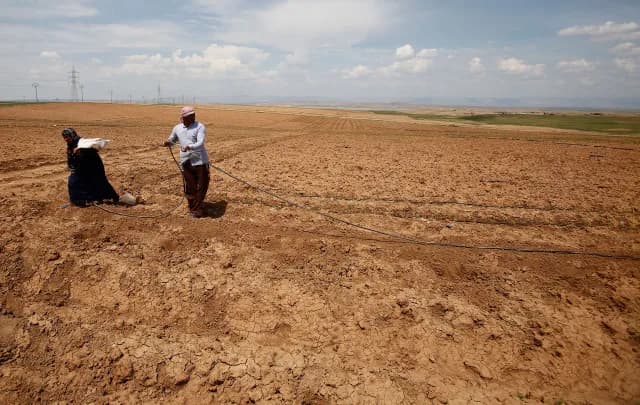We're loading the full news article for you. This includes the article content, images, author information, and related articles.
Baghdad's drastic cuts to wheat and barley cultivation amid a severe water crisis highlight the growing fragility of global grain supplies, posing a significant threat of price volatility for import-dependent nations like Kenya.

The Iraqi Council of Ministers, in a decision announced from Baghdad on Tuesday, 5 November 2025, has approved a severely restricted agricultural plan for the 2025-2026 winter season due to an ongoing and devastating drought. The plan, confirmed in a statement by the office of Prime Minister Mohammed Shia’ al-Sudani, limits cultivation using surface water to just one million Iraqi dunams (approximately 250,000 hectares) and mandates the use of modern irrigation for all wheat crops to conserve dwindling water resources. An additional 3.5 million dunams will be cultivated using groundwater.
This decision, which halves the area previously cultivated with surface water, comes as water levels in Iraq's vital Tigris and Euphrates rivers fall to their lowest in decades. Experts attribute the crisis to a combination of sharply reduced rainfall, rising temperatures linked to climate change, and the construction of dams in upstream countries, primarily Türkiye and Iran. The United Nations now ranks Iraq as one of the five countries most vulnerable to the impacts of climate change.
The consequences for Iraq's agricultural sector, the country's second-largest contributor to GDP after oil, have been catastrophic. The Norwegian Refugee Council (NRC) reported in November 2024 that the severe drought had forced one in two farming families to cultivate less land. This has led to widespread crop failure, with wheat and barley yields plummeting, threatening the livelihoods of millions and increasing displacement as farmers abandon their lands.
In response to the crisis, Baghdad has intensified diplomatic efforts. On Sunday, 2 November 2025, Iraq and Türkiye signed a crucial executive mechanism to implement a water cooperation agreement. Hailed by Prime Minister al-Sudani as a potential sustainable solution, the deal establishes a framework for joint projects to improve water management, modernize irrigation, and rehabilitate agricultural lands. The agreement will be funded through a dedicated account financed by the sale of Iraqi crude oil to an approved Turkish company, creating an oil-for-water infrastructure arrangement. While the deal offers a path forward, some reports have raised concerns over clauses that could grant Turkey significant temporary oversight of Iraq's water infrastructure.
While Iraq is not a primary grain supplier to Kenya, its agricultural collapse is a critical indicator of the increasing fragility of the global food system. As climate change intensifies, similar drought-related production shocks in grain-exporting regions can trigger significant volatility in international markets. For Kenya, a nation heavily reliant on imports for staple foods, these global tremors have direct and immediate consequences for national food security and the cost of living.
Kenya imports the vast majority of its wheat, with consumption far outstripping local production. In 2023, Kenya imported approximately US$654 million worth of wheat, primarily from Russia, the United States, and Ukraine. The country's wheat market is highly sensitive to international price fluctuations, as demonstrated by price hikes following the Russia-Ukraine conflict. A study by the University of Nairobi confirmed a high degree of price transmission, with an estimated 78 percent of price changes in the Ukrainian market being passed on to Kenyan consumers.
The situation in Iraq serves as a stark warning. The removal of a significant producer from the market, even a mid-level one, tightens global supply and places upward pressure on prices. According to the World Food Programme's Global Report on Food Crises 2025, such shocks disproportionately affect import-dependent nations, exacerbating hunger and economic strain. With East Africa already facing its own climate-related challenges and grain deficits, any increase in global grain prices directly impacts the cost of bread, flour, and other essential food items for Kenyan households. Therefore, the crisis unfolding in the ancient 'land between two rivers' is not a distant problem but a clear signal of the interconnected challenges that define global food security in the 21st century, demanding urgent attention from policymakers in Nairobi and across the region.
Keep the conversation in one place—threads here stay linked to the story and in the forums.
Sign in to start a discussion
Start a conversation about this story and keep it linked here.
Other hot threads
E-sports and Gaming Community in Kenya
Active 9 months ago
The Role of Technology in Modern Agriculture (AgriTech)
Active 9 months ago
Popular Recreational Activities Across Counties
Active 9 months ago
Investing in Youth Sports Development Programs
Active 9 months ago